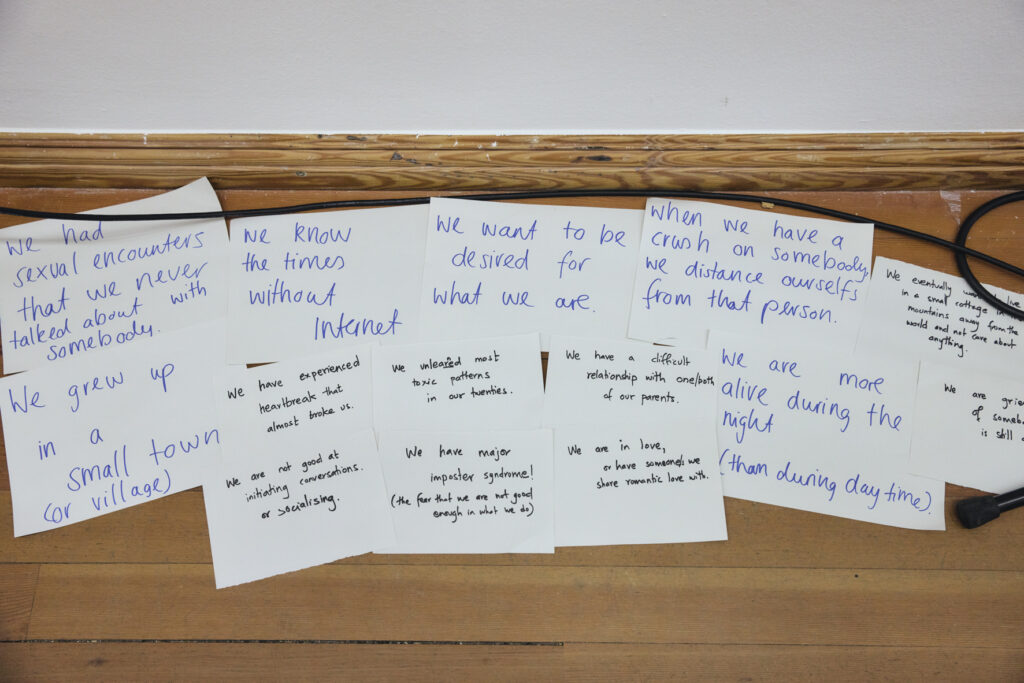The Theatertreffen blog, also known as the Reflection Treffen, has been an integral part of the long-standing German-speaking festival since 2009. The platform was created to facilitate discussions around the festival and the theatre productions presented there. Since 2016, the blog has been sponsored by the Stiftung Presse-Haus NRZ.
This year for the first time I had the opportunity to co-curate the Theatertreffen blog together with Antigone Akgün, assisted by Anna Reimnitz. Through an open call, five bloggers (out of almost 100 applications) were selected to work with us for 18 days – the entire duration of the festival. We were looking for people with a professional connection to the theatre, but also for those for whom our collaboration was not an obvious continuation of their career paths, i.e. people from working class families, with a migration background and knowledge of contexts outside the German-speaking cultural sphere.
We met daily for editorial meetings to discuss the productions and events we had seen. The working languages were German and English. Our aim was not only to describe and aesthetically evaluate what we had experienced, but more importantly to reflect on it and make connections to other socially, politically and ecologically relevant issues. As editors of the blog, we did not prescribe a particular form of expression for the fellows. We encouraged writing, direct discussion and constructive criticism within the group, as well as translation and interpretation. Many forms of collaboration developed on the spot through direct exchange.
In addition to the reflexive and commentary character of our work, which focused mainly on the Haus der Berliner Festspiele, we proposed an accompanying programme. It was based on the concern to „go out of the institution“ and visit places of community cultural production in different districts of multilingual and multiethnic Berlin. Thus, in the first week of the festival, we visited the community broadcaster Cashmere Radio, with whom we produced a podcast summarising the events of the festival, and the Kurdish Women’s Office for Peace Cenî, where we heard a lecture on structural and militant feminism.
In particular, the visit to the Kurdish Women’s Office was different from the experience of being in an institution with its strictly controlled access and many exclusions. We found a vibrant place where community, culture and socio-political work intersect. We were welcomed with tea and food and began our meeting by getting to know each other, followed by a tour of the space where the Kurdish community cultivates their sense of belonging by organising events. This direct translation of social practice into cultural practice was one of the most stimulating experiences of the whole Theatertreffen. For cultural production is not only about the elaborate shows on the big stage, but above all about the hands-on process of community building.
A part of the programme was a visit to the Cultural Workers Studio in Kreuzberg, a group of cultural practitioners who have fled the war in Ukraine and who are already working in Berlin. Axxi, Hanna und Richard showed us their building and told us about their daily practice. They shared with us a video „Hanny in the Factory“ about the danger of the eradication of local culture in Ukraine, prepared a participatory performance and invited us to talk over food and drink.
We also saw Cornelia Herfurtner’s exhibition at Alpha Nova Galerie Futura, ‚Of Air Mattresses, Straw and Other Weapons‚, about passive weapons, i.e. objects that change their function and role in the eyes of the authorities during demonstrations, transforming from ordinary mattresses or diving goggles into evidence in criminal proceedings against activists. Through extensive research, Herfurtner has tracked down court decisions against those who used these objects during protests. For the exhibition, she has given them the form of wooden shield reliefs into which she has carved the aforementioned objects: the main protagonists in the scene of social conflict. In this way, the artist questioned how violence is both produced and disguised in the democratic state, exploring the power of interpretation over public space.
Another memorable encounter was the final meeting of the series, a visit to the editorial team of Arts of the Working Class, a multilingual street magazine about poverty and wealth, art and social issues, which exists both in print and as an online platform. The magazine looks at different forms of cultural production, which often seek non-institutional and non-commercial forms of expression and distribution. The current issue, for example, looks at grassroots organisations, funding and solidarity in transnational contexts. The print edition of the magazine is distributed by vendors, who can pick up the magazine for free from distribution points and sell it on the street, keeping the value generated for themselves. The magazine is financed by public funds and by advertisements commissioned mainly by cultural institutions.
TTBLOG’s programme of reflection, critique and ‚going out of the institution‘ aimed to broaden the discussion about what theatre is, how one can participate in shaping the public cultural space, and how real democratic, horizontal and accessible institutions of the future can not only be imagined but actually implemented. For it is only through concrete action that the institution, and the Theatertreffen in particular, will not only be supported by public money, but will also become truly public in character, which would mean leaving behind the ivory tower of the „industry event“. This could start with something small, such as acknowledging that culture, including theatre, in Germany, Austria or Switzerland is diverse and multicultural and does not automatically have to be German-speaking.
